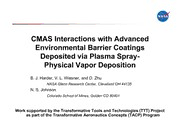
NASA Technical Reports Server (NTRS) 20170005220: CMAS Interactions with Advanced Environmental Barrier Coatings Deposited via Plasma Spray- Physical Vapor Deposition PDF
Preview NASA Technical Reports Server (NTRS) 20170005220: CMAS Interactions with Advanced Environmental Barrier Coatings Deposited via Plasma Spray- Physical Vapor Deposition
CMAS Interactions with Advanced Environmental Barrier Coatings Deposited via Plasma Spray- Physical Vapor Deposition B. J. Harder, V. L. Wiesner, and D. Zhu NASA Glenn Research Center, Cleveland OH 44135 N. S. Johnson Colorado School of Mines, Golden CO 80401 Work supported by the Transformative Tools and Technologies (TTT) Project as part of the Transformative Aeronautics Concepts (TACP) Program Motivation • Incorporation of Si-based ceramics into turbine hot section has substantial benefits – Limited by water vapor attack • Environmental barrier coatings (EBCs) are necessary to protect the underlying ceramic • Current NASA goals require durable coating systems at 1482C (2700F) – Limited recession and good adhesion • Traditional processing methods may not be able to meet the requirements – Plasma Spray-Physical Vapor Deposition (PS-PVD) Plasma Spray-Physical Vapor Deposition (PS-PVD) • Bridges the gap between plasma spray and vapor phase methods – Variable microstructure – Multilayer coatings with a single deposition • Low pressure (70-1400 Pa) High power (>100 kW) – Temperatures 6,000-10,000K Planar Columnar • High throughput1 – 0.5 m2 area, 10 mm layer in < 60s • Material incorporated into gas stream – Non line-of-sight deposition • Attractive for a range of applications 20 mm 40 mm – Solid oxide fuel cells, gas sensors, etc. 1A. Refke, et al. Proceedings of the International Thermal Spray Conference, May 14-18, (Beijing, China), 705-10 (2007). Yb Si O /Si-HfO EBCs 2 2 7 2 • Bulk SiC substrates 0.5” x 0.75” As-deposited 2-layer EBC • Bond coat was Si-HfO 2 – “Bricks and Mortar” structure – Starting powder 30/70 mol% Yb Si O 2 2 7 HfO /Si 2 EBC • SiO -lean Yb-silicate 2 Si-HfO – 35 mol% Yb O bal SiO 2 2 3 2 Bond – Fully reacted 85/15 wt% Coat Yb Si O /Yb SiO 2 2 7 2 5 50 mm – After deposition coating contained some free SiO (~10 wt%) 2 • Heated in air to 1300°C for 20hr prior to CMAS exposure CMAS Exposure CMAS Composition (mol%) • CMAS composition was melted at 1500°C and quenched CaO MgO Al O SiO Na O K O Fe O 2 3 2 2 2 2 3 23.3 6.4 3.1 62.5 4.1 0.5 0.05 • CMAS was milled and tape cast at a loading of ~29 mg/cm2 • Tape area for exposure ~ 2mm x 2mm – Total tape weight before burnout 1.50 - 2.0 mg • Binder burnout at 500°C (6 hr) • Ramp rate ~5°C/min to target temp • Cross-section through center of reacted zone 5 1200 C/10hr ° • Tape became shiny and exhibited wetting on the surface of the coating • Total ‘affected zone’ was ~5mm • Macro image showed the glass did not go fully 5mm molten Affected Zone (5 mm) Residual Epoxy 500 mm Glass 6 1200 C/10hr ° Unreacted With CMAS 50 mm • Glass did not significantly attack or infiltrate the EBC • Interaction zone with top of EBC layer of ~10mm – Si:Ca:Yb ratio of 3:1:1 • Underlying EBC and bond coat did not show any signs of glass infiltration 7 1200 C/10hr ° Unreacted With CMAS 50 mm • Glass did not significantly attack or infiltrate the EBC • Interaction zone with top of EBC layer of ~10mm – Si:Ca:Yb ratio of 3:1:1 • Underlying EBC and bond coat did not show any signs of glass infiltration 8 1200 C/10hr ° Unreacted With CMAS 50 mm • Glass did not significantly attack or infiltrate the EBC • Interaction zone with top of EBC layer of ~10mm – Si:Ca:Yb ratio of 3:1:1 • Underlying EBC and bond coat did not show any signs of glass infiltration 9 1300 C/10hr ° • Tape completely wet surface and coating raised off surface by ~0.75mm • Total ‘affected zone’ was ~7mm 7 mm • Macro image showed coating was thinned near the center of the tape Affected Zone (7 mm) Bubble Epoxy 500 mm 10
